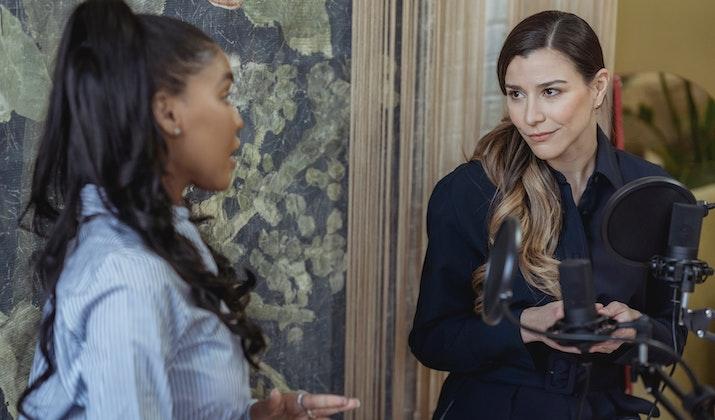Getting a job interview is the exciting moment after applying for jobs and finally being chosen to show your best with the chance of getting employed.
Employers often have a standard set of questions they ask interviewees. And while questions might seem simple, employers can find out a lot about the interviewee from just one question.
In this post, you’ll learn how to prepare yourself to answer the “why do you want this job?” question. This will help you to showcase your best strengths to improve your chances of getting the job.
Stay tuned!
Tips on Answering “Why Do You Want This Job?”
The way you answer this question, you’ll give the employers an image of yourself, your dedication, personality, character, previous work experience, and anything else they might not see on your CV. Therefore, use these tips to help shape your answer to this simple but important question.
Don’t Forget to Mention Skills
Image by Mart Production via Pexels
Many people feel that mentioning their skills to this question might feel like bragging, but that’s far from it.
While you will list your skills on the CV, you should still mention skills that make you unique and that will make you stand out from other candidates.
These skills can be related to your previous work experience or previous jobs you were trained to do. They can also be things you are specialized in and have been taught to do through schooling.
While your CV will only list the skills, you can use this question to tie these skills to reasons why you want this job, and even why you deserve this job.
So when asked the question, talk about your skills while directly referring to your accomplishments followed by your qualifications. This will not only show why you want this job but also show how you would fit into the company and fulfill the role.
Skills are important because employers are either going to try to fill an existing position (so you’ll be filling someone else’s shoes), or they’ll be looking for someone for a fresh position.
Either way, they’ll want to ensure your skill sets line up with their expectations and needs before you go through to the next stages of the interview process.
So starting your answer by mentioning skills is a good way to have an advantage, especially over other candidates who might be as prepared as you are.
Also Read: How To Answer “Walk Me Through Your Resume”?
Showcase Your Work Experience
Image by Tima Miroshnichenko via Pexels
A great thing about work experience is that you can tie it with skills so it can be a second point of answering the question.
Just like skills, your work experience will be listed on your CV and the employer will have it right in front of them. However, you can use this opportunity to tell more about your experience and the type of work you did for previous employers.
This is great to include when answering the question because you can use the opportunity to quickly and concisely make active statements about your work experience to outline your abilities and skills.
Of course, you don’t want to be too elaborate, but provide the most necessary details in the simplest way possible.
You want to talk about your experience, things you’ve done using your skills, things you’ve learned, and how those can help you fit the needs of the position you’re being interviewed for.
It’s also ideal to illustrate the connections between your previous roles if they fit the role you’ve applied for. This will help you showcase your additional skills and qualifications that might not be required but could be useful for this role.
Any advantage you can think of is welcome, and while you don’t want to add too many examples of previous work experience, you should pick the ones that fit the role in question.
Check Out: Why Should We Hire You With No Experience?
Express How You Can Add Value to the Company
Image by Lukas via Pexels
Of course, before going for an interview, you want to do some research on the company, see its values, what they stand for, what its mission is, and what some of its accomplishments are.
This way, when answering this question, you can include ways you would add value to the company and improve the company’s work.
Every company will have different goals and will require a different set of skills and types of people. But if you’re liking the company and you feel like you’d make a good addition to their team, you’ll already have a feeling of the type of people who work there and what the culture of the company is like.
Incorporating this into the answer to the question will help you feel like a part of the company even before you get the job.
Also, the value you express can cover anything from your skills, experience, past workplaces, expertise, and more.
You should also include a couple of specific examples that describe how you would contribute value to the position if you’re hired.
Check Out: Why Should We Hire You?
Explain Your Attraction to the Position and Why You’d Work Hard
Image by Tima Miroshnichenko via Pexels
There must be a clear reason why you were attracted to the position you applied for. While it might be a great idea to be honest and say whatever the reason is, even if it’s the money, you should also try to tie it together with ways you can benefit the company.
Companies are interested in skills, work ethic, and previous experience. But by including this in the answer, you’ll be able to tell more about yourself and your personality from a different perspective.
You will be able to show you’re honest, your motivation behind your application, and also show excitement even before knowing if you got the job.
This is an approach that not many candidates will even consider or know how to execute correctly. But if you do this right, it could give you a huge advantage in standing out among others.
You can also show you’re motivated and explain the reasons behind the motivation in a couple of examples. Some of them can include the ability to learn more or grow your skills.
It can even be to work for a serious company that you’d love to be a part of and feel appreciated in return.
Of course, on top of that, you can also mention how not only you would be able to benefit professionally and financially, but also how you can help the company do the same.
Therefore, these are just some of the reasons you can include and make it look like a win-win situation for both you and the company. Possibly, it can even lead to having a better chance of being hired.
Also Read: Best Examples of “Tell Me About Yourself”
Don’t Be Afraid to Show Both Strengths and Weaknesses
Image by Tima Miroshnichenko via Pexels
You have to keep in mind that companies might have requirements and qualifications you have to meet, but they’re out there to hire people who are genuine and fit their company.
While candidates mostly talk about strengths on both their CV and during the interview, another good idea is to show your weaknesses too.
Even before you think it might have the opposite result, hear us out. You can start with your strengths and tie them with your skills and ways you can benefit the company. This part will help you show that you’re the right person for the position.
But you don’t need to stop there. Instead, you should include one or two weaknesses that will make you seem human.
Of course, immediately tie these weaknesses with ways you can improve them if you become a part of the company. You can use this to show how you’d be able to get the job done, but also how this role would help you grow at the same time.
This way, you’ll appear genuine, showing interest in growth and progress, and also as an investment from the company’s point of view.
This won’t only show why you want this job but also how far you’re willing to grow and do well in the role both for yourself and also the company.
Talk About Stress and Pressure (Your Character)
Image by Mart Production via Pexels
One thing you can’t showcase in your CV before the interview is your character. That’s one of the things that the company will learn more about the moment you step into the interview and you start answering the questions.
But why do we recommend you talk about stress and pressure?
Stress and pressure are the two most common things employees deal with in work situations. It takes a strong character, a cool head, and a skilled worker to deal with these two alongside the work that needs to be completed.
Therefore, it’s recommended to talk about how you deal with stress and pressure and include this in the answer. That’s most likely exactly what the employer is wanting to figure out (but keep in mind that this depends on the role).
Besides your skills, you can talk about things such as your risk-taking ability, energy levels, creativity, organization, positivity, and other characteristics that fit you.
While companies want to hire the best candidates, what happens if there is more than one qualified candidate they’re interested in?
Apart from the skills and the ability to fulfill the role, employers will also evaluate the personality, characteristics, and even the general vibe of a candidate can have an impact on the results of the interview.
So you don’t have to be someone you’re not or say something you’re not comfortable with.
Instead, try to find out what your characteristics are, make a list of them, and choose a couple that would be worth mentioning.
Since all companies have missions and goals, you might never know when your characteristics perfectly align with the company.
Talk About the Future
Image by iPrice Group via Pexels
Depending on the position you’re applying for, most companies that are looking for long-term employees will consider them as an investment.
This means you will come into the company at a certain age, with a certain level of experience and skills, but you’ll be helping the company grow by providing solutions.
For such a reason, companies will want skilled and experienced people who can do their job well. The second thing they’re looking for is people who will fit their company’s profile (personality and characteristics).
Lastly, companies will want people who are looking forward to being a part of the company, will stick with the company for a longer period, and will grow with the company.
Even if you have experience and the skills needed for the position, it’s a good time to think of ways you could improve, new skills you can acquire, and experience you could gain. From there, talk about your future and where you see yourself in five years with the company.
This will show the employer how serious you are about the role, how reliable you are, and how hard-working you will be. It will also show how you are there to achieve your goals which will also benefit the company.
Therefore, companies who are looking at people as an investment will appreciate this. So any dedication you make will help you stand out from others who might have the same qualifications as you.
Explore: How To Answer “What Are Your Salary Expectations”?
Find Specific Examples of Your Previous Work Experience
Image by Sora Shimazaki via Pexels
If you’re applying for a job that is similar to one of your previous jobs, it would be a good idea to show the employer why you want this job through specific examples. This can be anything as simple as what you can contribute to the company.
This means that you can think of things you’ve been handling at previous jobs, pinpoint a couple of things you’ve been good at, and showcase them during the interview.
You can use those examples to show that you have the necessary experience, that you have the necessary skills, and that you are willing and dedicated.
Of course, this will also show your desire to continue doing what you believe you’re good at for the benefit of the company.
However, if you don’t have much experience in your previous roles, you can always combine it with your future perspective. If that’s the case, you can talk about how you’d like to develop yourself, grow your career, and fit into a company established enough to let you do that.
You should also combine this with specific examples of things you’d like to learn or ways you’d help the company.
This is just another way to showcase why you want this job without directly saying a reason but slightly impressing the employer with your way of thinking. But keep in mind, you need to tie it together with reasons why you want that job.
Also Read: How To Politely Ask For Salary In An Interview?
Talk About What You’d Like to Achieve
Image by George Milton via Pexels
There’s no better way to show you’re motivated than to talk about achievements you’d love to reach within the company.
While many candidates focus on the achievements they’ve already done, it’s a great twist to talk about future achievements.
This will show the employer you’re embracing the role, ready to work hard, and have personal goals that will also help the company. Companies will definitely see this as a win-win situation.
Some of the things you can mention you’d like to achieve include improvements in your skills, doing more within the role than you could do at a previous job, or building new skills.
Of course, one of the best ways to tell what you’d like to achieve is to aim for promotion and progression within the company.
This also goes well with the tip that tells you to talk about the future perspective, but also to prove yourself valuable.
Combining future achievements with your current skill set and where you’d like to see yourself in the future is a great balance you’re trying to achieve.
It can help show the professional character that companies look for right after the skills and qualifications.
A great thing is that you can be as elaborate or as narrow as you wish with this tip and you may or may not include it, it’s up to you.
Check Out: Interview Mistakes To Avoid
Bonus: If You Have No Previous Experience
Image by Andrea Piacquadio via Pexels
It can seem like a real hassle applying to a job without any previous experience considering you might not get a chance against qualified candidates.
But if you have a decent CV, prepare yourself for the questions you might be asked, and show a positive and healthy attitude towards work, you will stand a greater chance.
When you are asked why you want that job, your best bet is to talk about your current skills and any available previous experience such as internships. Then, you can apply the other tips included in this article.
The tips you can follow include talking about your personality, character, growth, future goals, and achievements.
Even without previous experience, you can come prepared and you’ll be able to show that you are a good investment even though you’re only getting started.
Also, it’s important to talk about the future and what you’d like to achieve, where you see yourself, and how you would like to progress and learn.
Even without any previous work experience, you will be able to stand out over qualified people who didn’t come prepared for these questions.
Also Read: Things Not To Say In An Interview
“Why Do You Want This Job?” Answer Examples
Example #1
I want this job because I feel confident enough to adapt well to a fast-paced company like yours where I can provide a lot of value with my skills and work experience.
I believe this role would fit me perfectly to hone my skills.
Example #2
I did a bit of research on the company and think it would be a great fit for me. I believe I could contribute a lot of value to the company.
I’ve learned that your company is good at growth and that’s my personal goal. I would like to improve my skills by being a part of a business that’s focused on expansion.
Being in the same industry for several years, I can tell that this is what I enjoy doing the most.
With exceptional organizational skills, positive attitude and the ability to follow deadlines, I am sure to make a significant impact through my work.
Also Read: Worst Job Interview Examples & What To Say Instead?
Conclusion
While all of these tips are general, you should tailor your answers to the company, industry, and role you are seeking.
Employers want to know if your career goals are aligned with the company’s needs and goals.
So while you should mention skills and experience, answering this question is your chance to tell more about yourself and show your professional mindset.
The company will evaluate how much you know about them, their mission, and also their accomplishments and goals. Therefore, knowing this will set you apart from other candidates.
And if you answer the “why do you want this job” question right, you’ll have an advantage over candidates who might seem to be a better choice on paper.
















